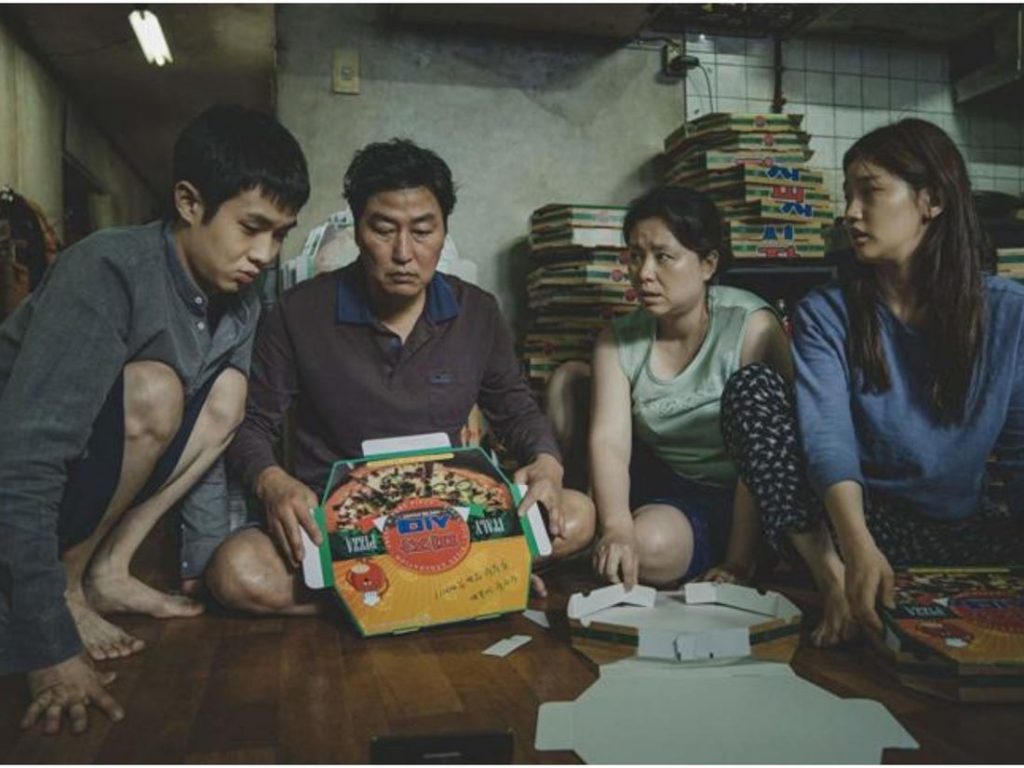
The multi-award winning South Korean movie Parasite is a feast of stunning surprises and irresistibly eloquent symbolism.From the very title and its ambiguity to the hierarchy of three families inhabiting a layered architectural splendor, metaphor is everywhere. Look at the three families and their visibilities, spatial agency and even smells. Parasite is inevitably about the politics of space, its ownership and occupation, ethics and autonomy; and it reaches us in one of the worst times of spatial politics in history. The plot of the film is now famous: a miserably poor family placing themselves inside an uphill Seoul mansion as employees, one by one, on different identities, without revealing the fact that they are family, to serve an elite family. The rich is not particularly painted dark, nor are they shown greedy. Similarly is the poorsketched: struggling and lovable people; their manipulations and masquerading are their survival tactics. At one point, the poor father Kim is even worried about what might have happened to the previous chauffer whom his daughter tricked to get fired. The two families – with their stark contrasts and striking similarities – are yet to see a third family emerging in the same space, from the underground cellar, with more severe conflicts of interests, eventually leading to a brutally violent tragedy.
Parasite brings three categories of people: one, those who are comfortably visible and enjoy the ownership and authority of space; two, those who need to hide/change their identities to be in the space and survive; third, those who are forced to hide themselves and are through different levels of continual oppression. From citizenship conundrum to refugee crises to caste to class, this allegory is gripping.
Hiding yourself in a cellar is never a choice, anyway. It is an imposition. It reminds you of the detention centers India has been building and the concentration camps Nazi Germany had once built. Your right to life, right to existence is under threat. Violence can tirelessly and endlessly create more violence. Structural, stable, systemic violence can remain invisible to those who are not directly affected by it; but that insensitive invisibility has a price to pay: your life, your peace. Like what happens to Mr. Park, the millionairehouse owner in the movie. The blind luxury and apolitical callousness definitely come to a forced halt. The cellars, the detention centers, the refugee camps, fenced walls, gas chambers would hit back with its poetry in blood. Andthat surely is not going to be something beautiful to see. But it shall come. It is already on the way.
This is what Parasite appears to be warning us, in a mild, bloody way: the retaliation. The rise of the downtown (as literally against the fall of the downtown in an unforgiving flood). The vengeance of the hungry. The defiance of the downtrodden. With their reeking smell (of the people who run subways), eerie look and ghostly existence, they would, one day,make their way to your scenic, yummy, decorated lawn and disrupt your overjoyed party with blood in their hands. For, they have been there, wretched and broken, for an unbearably long time, undergoing violence, whether you acknowledge or not. Living life without freedom and dignity is mere violence. They needed space, having been forced to keep themselvesunder the lowest rung of our amazing architectural splendor (an allegorical allegation on our civilization, which works on the mere logic of wealth and fails to see tolerance and mercy in its prism). Your utopia has been their dystopia. Your heaven, their hell. You work hard, they also work hard. You end up at the serene, scenic hilltop with elegant spaciousness and they end up in a dirty semi-basement with claustrophobic dumbness. And worse, further downward, a semi-dark cellar, a hidden, illegal life.
In the film, you see the father and children run downwards through the midnight downpour, stepping down innumerable stairs to reach their flooded semi-basement home. The entire neighbourhood is sinking, submerging. Parasite, as director Bong Joon-ho’s filmographic legacy shows and he himself appears to be suggesting in interviews, is not just a critique on the class divide, but also an attack on the way capitalism functions.
The subtleties of the North Korea – South Korea crisis are not so subtle in the movie. In many scenes, particularly when the autonomy or agency of the space is contested – between two parties whereas both neither belong to it nor own it – the divide and the conflict surface up, sometimes in satire and sometimes in allegory.
In a historically troubled times where billions of refugees are struggling hard to find a space to sleep and shelter themselves, when wars are imposed upon countries and natural calamities displace huge populations (climate refugees included), Parasite brings forth the fundamental questions: whose space we are in, actually? Who owns the space? Or rather, who should own it and how could it be governed? Could it be shared? What is the logical premise of building a space so spacious? How ethical can the space be used? What gives you the authority or autonomy over a space – money, experience, reputation, ethnicity, identity, what else?
Space being the fundamental resource, it enables you to findand use other resources. It is akin to citizenship being “the right to have all other rights”. Once you are deprived of your dignified space – both public and private – then you are lost to non-existence. Parasite, with its treasure of symbols and allegories, both in violence and humour, can be taken as a wake-up song for those who are radically interested in the potential of reimagining and resurrecting spaces, inner and outer, so that life’s party goes on for all.
Muhammed Noushad is an editor with Other Books, Calicut.
SIGN UP FOR COUNTERCURRENTS DAILY NEWS LETTER










































